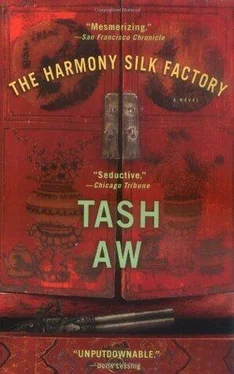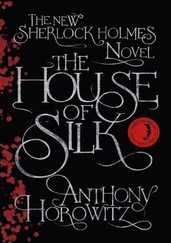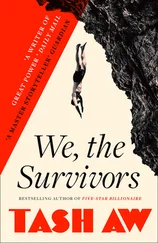Johnny’s face coloured. His blood ran hot. He had felt the rush of air against his cheek as the parang swept past him. He had seen the sun glinting off the blade. At last, he knew he was truly and irreversibly a Communist.
“What I think,” Gun said, as he prised the parang from the soil and wiped it clean with his fingers, “is that anybody who can cut up and kill an English big shot, well, that person might be very useful to us.”
“Will I fight for the liberation of man’s soul from the chains of the bourgeoisie?” Johnny said.
Gun stared at him blankly.
“What do you want me to do?” Johnny said.
Gun laughed. Johnny could not tell if it was in contempt or in friendship. “That’s up to Tiger,” he said.
The only problem with being a Communist — for Johnny and for Tiger — was that it interfered with business. It interfered with running the shop and serving customers and deciding which clothes to display in the glass cabinets. For Tiger, the problem was one he had faced for many years now. He had become accustomed to it all — the rotten, ever-present fear of exposure and arrest, the risk of betrayal. Sure, he was among his people; and yes, he knew he had their trust. All the same, he was careful not to make enemies. He never took advantage of suppliers or customers. People are people, he told himself. A single vengeful word whispered in the ear of the district police inspector would be sufficient for Tiger to be locked up in Tambun Prison for the rest of his life. For more than a decade, this fine gentleman had coordinated the activities of the Perak guerillas from the genteel surroundings of his shop. Now, as the 1930s drew to a close, the strain of this duplicity weighed heavily on him. The knowledge that he was sending young men to be shot, maimed, or imprisoned for life began to disturb his sleep. He wanted to close his doors to the world, to shut himself in his home with his books and furniture and fruit trees, but no: the call from China was becoming more urgent, more violent. The Japanese were in Manchuria now and Chinese all over the world were being called to arms. These were times for action, the Party said, for the enemy was at the gate; but all Tiger longed for was to grow the perfect guava. He felt age in his bones and reluctance in his heart. In his sleepless nights he had the same thought over and over again: he had to stop, he could not go on.
He was glad he had Johnny.
Early one evening when the sun had calmed to a deep amber, a thought came into Tiger’s head which made him shiver gently with happiness. He had spent the day planting papaya seedlings he had grown from the seeds of his own fruit. Though the work was not heavy, it was enough to make a man of his age feel as if he had earned a rest. After dousing himself with cold water he sat in the cane armchair in his library with his supper of cold noodles. When he finished those he poured himself a small glass of cognac. He had not been to the shop at all that day. He thought of Johnny, he thought of the customers; he tried to fill his ears with the noise of the shop, the smooth-sharp sound of heavy scissors cutting through cloth, Johnny’s low mumbling voice, the clink of coins on the glass counter. He wondered how the shop looked without him in it, and the image of the Tigerless place did not trouble him. He knew then that the Tiger Brand Trading Company would survive his death and, more than that, would flourish. His whole world — which he had created — would grow unendingly. That thought was cemented when, at that moment, he saw Johnny running up the stairs at the front of the house, leaping two steps at a time. Elation mixed with relief, that is what Tiger felt. Now he knew there was no more reason for him to continue the struggle.
“Johnny,” he called, no longer able to keep his thoughts to himself.
“What’s the matter, Tiger? Are you alright?” Johnny’s brow creased with uncertainty.
“I want you to sit down with me,” Tiger said.
Johnny sat perched on the edge of a chair facing Tiger. He could feel the frame of the chair pushing through the thin upholstery, cutting into his buttocks.
“Corvoossier?” Tiger said, holding up the bottle of cognac.
“No, thank you.”
“It is said,” Tiger said, his face glowing and puce-coloured, “that tending to your garden is good for your soul. I can certainly testify to that. After a day’s work I feel cleansed. Funny, isn’t it?” He chuckled gently.
Johnny looked mystified.
“I don’t know how to explain this feeling to you. It is as if the work I put into looking after my plants makes me a better man. It makes me feel that I am a good person—”
“You are a good person.”
“—and for those few hours that I am in the garden, none of the bad things I have done in my life matter very much; they do not exist in my garden.”
“You have never done any bad things.”
Tiger smiled. “Don’t speak. Listen. You know I have worried about the shop. You know I am an old man now. That does not mean I do not care about the future of the shop, the future of everyone who works there, everyone who depends on the shop. I care. But I am old and tired, and soon I will die. I have spent much time in my garden lately, I know, but I feel no harm can come from this. Why? Because I have you, and you are ready for greater things.”
“Greater things,” Johnny repeated in his blank monotone.
“Yes, greater things! Tell me — what would happen to the shop if I was dead?”
“Do not say that.”
“But what if? What if? What would you do then?”
“Nothing. I don’t know.” Johnny’s face was stubborn and dull.
“Do you think the shop would survive?”
“Yes.” Johnny’s reply was instinctive.
“Why do you think it will survive?”
Johnny did not answer.
“Because of you. All that is mine will be yours upon my death.”
Johnny did not protest but remained expressionless as before.
The following weeks saw a small revolution in the textile business in the Valley. Following the example set by the larger companies in KL and Penang, Johnny introduced village-to-village selling. It had always occurred to him that there were many people who might have wanted to visit the shop but for one reason or another were not able to. In many parts of the Valley, the roads were little more than dirt tracks twisting through the jungle. When the rains came they washed mud onto the roads, and in the hot season the dust was so heavy and the sun so strong that a traveller could barely open his eyes. If these people could not come to the shop, Johnny thought, the shop would go to them.
Every Tuesday Johnny would cycle out into the jungle, taking with him a selection of cloths, heading for small villages beyond the reaches of the single tarred road running between Kampar and Ipoh. Each journey would last two full days and nights, and on the morning of the third day Johnny would reappear at the shop with no merchandise left on his bicycle. He built a little wooden platform on the back of his bicycle, fashioned from an old piece of teak which had once been the seat of a chair, worn smooth through years of use. Johnny lashed this tightly to his bicycle, and then tied the bales of cloth to it so that they stuck out at right angles. He soon became a familiar sight in the smaller villages of the Valley — a stern-faced man riding a funny contraption which seemed less like a bicycle than a moving pile of textiles. The children looked forward to hearing the ring of his bell every few weeks, for he always brought with him a large bag of boiled sweets, which he would distribute generously.
But sweets were not all Johnny brought. In each of the villages, he would seek out the people known to have Communist sympathies. He brought news, from Tiger, of what the Party was doing in the rest of the Valley. He told them about secret lectures and campaigns to raise funds for the movement in China. He gathered information too, and soon he knew which farmers had sons who wanted to join the Party, which villages were not sympathetic to the Cause, which people could be relied upon to provide donations. He knew the villages as he knew people — some were friends, some reluctant allies, others plain enemies. There were beautiful ones, ugly ones, dull ones, naughty ones. Soon he knew everything. More than Tiger himself.
Читать дальше
Конец ознакомительного отрывка
Купить книгу












